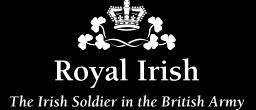Explore Listing
Both the 1st and the 2nd Battalion The Royal Irish Rifles were relieved from their positions in the Ypres Salient on 5 June 1917.
The 89th Regiment was serving in the West Indies on 15 June 1837.
The Young Citizen Volunteers of Ireland (YCV) was formed in 1912 and joined with the Ulster Volunteer Force (UVF) in 1914 to become its Belfast battalion. Following the conversion of the UVF into the Ulster Division, the YCV became the 14th Battalion of the Royal Irish Rifles. Known as the 'Chocolate Box Soldiers' because of their immaculate turn out, they were recruited largely from Belfast's middle class.
The 3rd Battalion 27th (Inniskillings) Regiment of Foot was raised at Dunbar on 27 September 1805 and was generally known in the Army as 'The Young Inniskillings'. While serving under the Duke of Wellington in the Peninsular War, the Battalion gained an excellent reputation for fighting the French, gaining many Battle Honours.
The Story of ‘Sergeant Daniel Beverley’ (Bailey) of Sir Roger Casement’s ‘Irish Brigade’ and his trial for High Treason.





